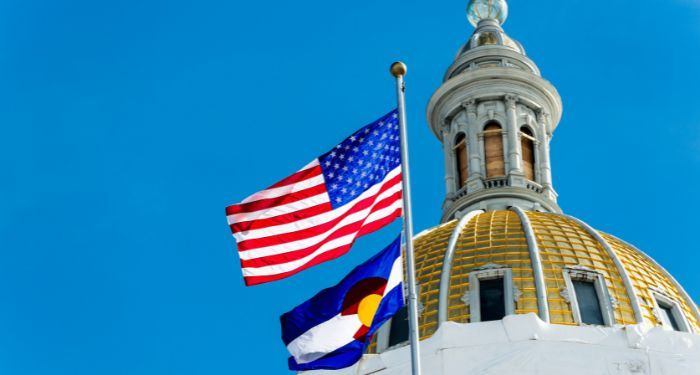
Colorado has officially banned books bans in public libraries across the state. Senate Bill 216, the Standards for Decisions Regarding Library Resources, was introduced April 24 by Lisa Cutter, Dafna Michaelson Jenet, Eliza Hamrick, and Junie Joseph. Colorado Governor Jared Polis signed it into law this week.
The bill emphasizes the role of professional knowledge and experience in creating public library collections. It acknowledges the growth of book removals based on ideology across the country and responds by requiring library boards to develop and follow written policies related to acquisition, retention, display, and use of library materials. The board is likewise required to develop a policy for materials reconsideration if citizens are allowed to challenge material in the collection and more, they must follow those policies throughout the reconsideration process.
Books that are challenged in libraries without a reconsideration policy cannot be removed, and books cannot be removed if the process to evaluate them is not followed. This ensures that there are policies and that those policies are unable to be manipulated before, during, or after a book is reviewed.
When a decision about a book’s future in the library is made, the board is responsible for making that information publicly available. This creates a record of books challenged, banned, restricted, and retained statewide–a huge step toward better understanding and quantifying one part of the ongoing book ban crisis.
The names of the individuals seeking to ban books in public libraries would be considered public record as well. This means that anyone can find out who is behind challenging books in public libraries–an issue that came up in the state in 2022, when four individuals in Gunnison County Library District attempted to remove Gender Queer from the collection. A state court ruled that their names were not public record and not subject to records requests. Senate Bill 216 states that those names are public record because those requests are not user records.
Senate Bill 216 also puts protections on library workers. They cannot be retaliated against, disciplined for, or removed from their work for not relocating or removing books that have not gone through the established review process. They’re protected, too, when acquiring materials or making displays of materials. In other words, the state recognizes that library workers are professionals in the field and not subject to the whims of politicians or the demands of the public–the bill requires boards to take on the role of creating the avenues for that right to challenge.
Library workers would be able to continue to operate professionally when it comes to weeding/deaccessioning materials. Those titles would not need to go through a formal review process per policy.
Unfortunately, the anti-discrimination provisions in the initial Senate Bill 216 draft did not make it to the final law:
The bill specifies that it is a discriminatory practice and unlawful for any person to discriminate against any individual or group in the acquisition, retention, display, use, or reconsideration of a library resource or in the use of a public library facility.
This portion was struck from the final bill. It is unclear whether that decision was made because it would be permitted for boards to include discriminatory elements in policy-making or because this anti-discrimination language is elsewhere in Colorado law and it inclusion here was repetitive. It is likely that given Colorado’s political leanings–it’s one of the most libertarian states in the nation–that striking this part from the bill was not necessarily about permitting discrimination but protecting “local control” of public libraries.
The bill’s scope is limited, too, to public libraries. Earlier this year, Colorado Senators proposed a bill that would include school libraries under anti-book banning measures, but the bill never made it far in the legislature.
“I just think it’s so important for kids to be exposed to a wide variety of experiences and perspectives,” said Senator Lisa Cutter, one of the bill sponsors. “Libraries help create empathy and understanding. Kids feel isolated when they don’t see themselves in society, but they can see themselves in books and media.”
Colorado has not been immune to book challenges and book bans over the last several years. In fact, some communities in the state have seen significant upticks in discriminatory attacks by book banners and those who have spread false narratives about the purpose of drag story times in public libraries. High Plains Library District fired one of its own librarians when she sounded the alarm about their discriminatory policies; she won a settlement against the library.
In May, Garfield County commissioners began appointing the public library board. Since 2008, the board itself appointed new members, but the county commissioners took over the process last fall in a hyper-partisan manner, following citizen complaints over materials in the children’s collection and comics collection–the same kinds of complaints seen nationwide founded on false narratives and rhetoric pushed by far-right groups like Moms For Liberty and No Left Turn in Education (Trish O’Grady, leader of the push against “pornography” in the Garfield County libraries proudly calls herself a “conservative Christian”).
The American Library Association recorded eight attempts to restrict access to books in Colorado between January and August 2023 alone, with 136 book titles challenged. This placed the state among the top for censorship attempts in this time frame. PEN America recorded eight book bans in school districts during the 2022-2023 school year. Among the institutions that experienced book challenges and bans in the last year are Douglas County Public Library, Academy District 20, Greeley-Evans School District 6, Wellington Public Library, Gunnison County District Library, Monte Vista School District, and others.
Colorado’s bill is not as robust as other anti-book ban bills across the nation. But the state joins those like Illinois, California, Maryland, and Minnesota who have taken the reality for libraries and library workers in this moment seriously. States passing such anti-book ban bills are helping ensure longevity and stability of one of the few remaining places of civic engagement and democracy in the average American’s life.






